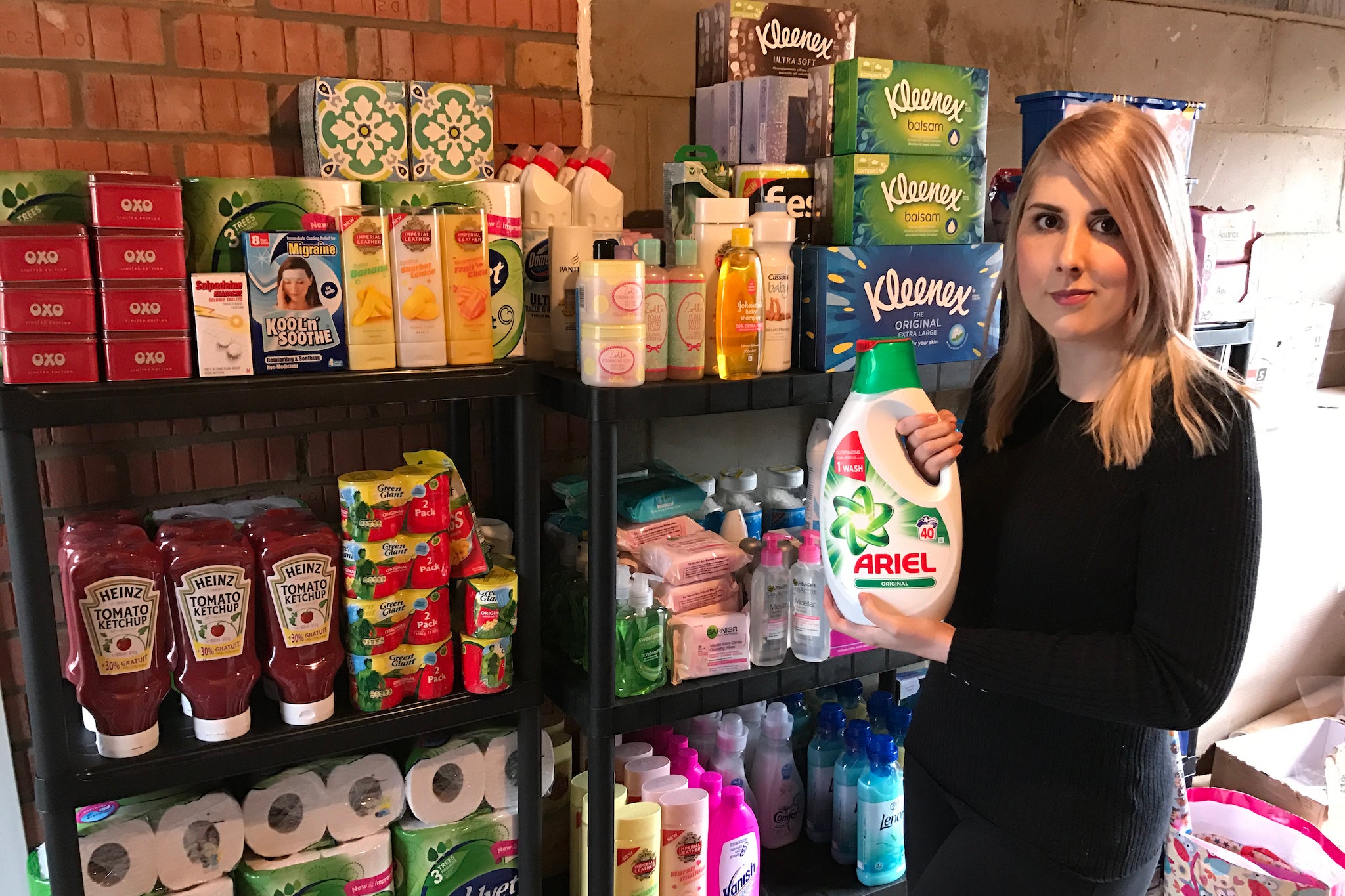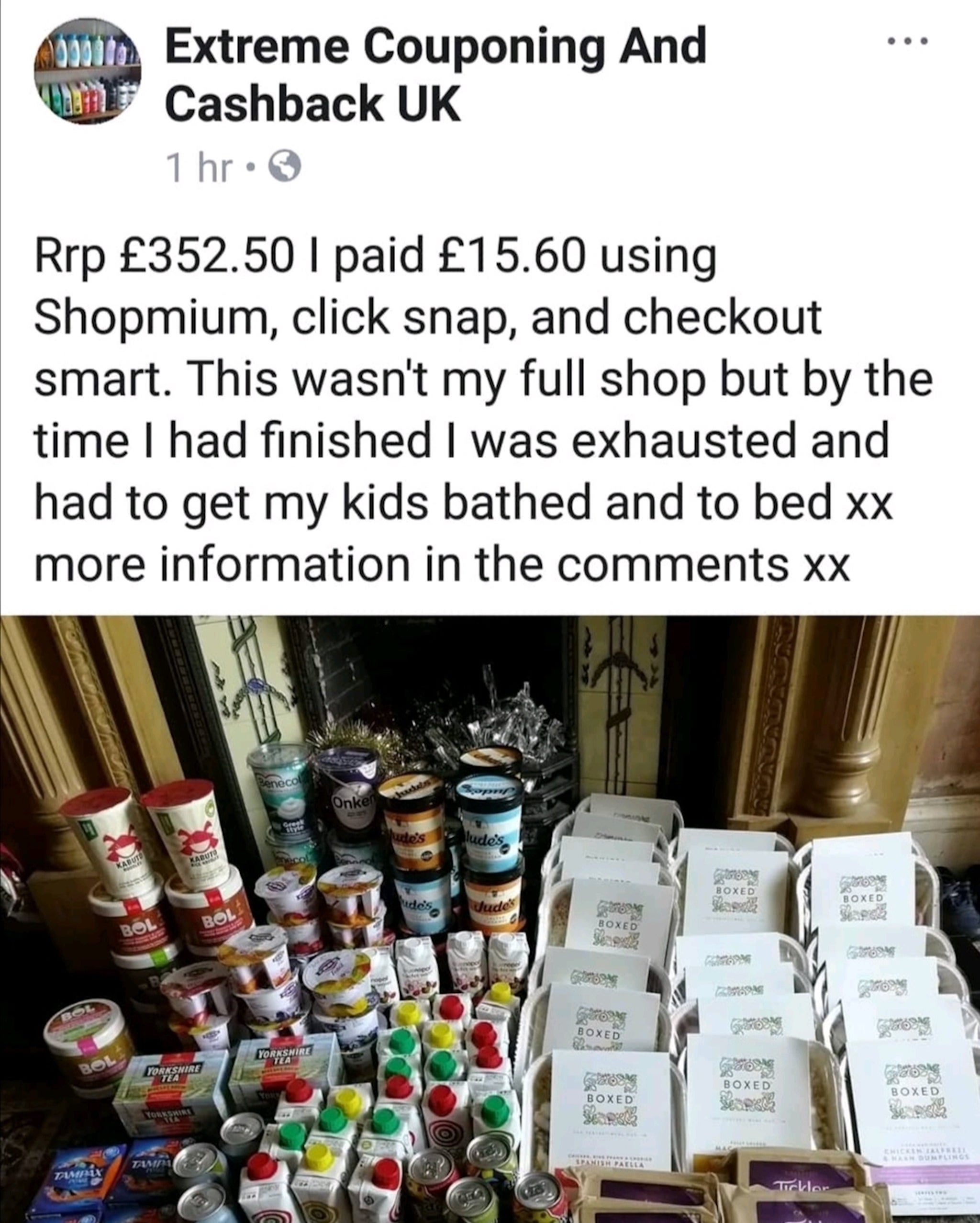‘My life is like Queenpins without the fraud’: Extreme couponing may have evolved in the digital age, but it’s here to stay
The shock resurgence of ‘Queenpins’ on Netflix has put couponing under the spotlight a decade after the success of TLC’s reality TV show. With food prices increasing at their fastest rate in 45 years, pinching pennies is looking more and more appealing – and necessary. Annabel Nugent speaks to the UK’s super-couponers taking coupon-clipping mainstream


Only a decade ago, couponing – a catch-all verb used to describe the practice of saving money using stackable discounts – was so idiosyncratic that anyone doing it properly and publicly was christened with a catchy moniker, like the “Coupon Queen” or the “Coupon Kid”. Now, record-high rates of inflation and a spiralling cost of living crisis have made the once niche art of scouring the internet for frugal hacks a sort of extreme sport – soon to make coupon queens, kings and kids of us all.
“God, really?” is a sentence I find myself muttering more and more as I browse the supermarket aisles. I’m not alone. Retail analysts have coined the term “shelf shock” to describe that very specific, dumbfounded feeling you get at seeing a box of Weetabix priced at £8. The reality is food prices in the UK are increasing at their fastest rate in 45 years. New words like “shelf shock”, “shrinkflation” and “hyper-pretflation” are being invented just to keep up.
Historically, coupon clipping – popularised by the aggressively American daytime show Extreme Couponing, which aired between 2010 and 2014 on TLC in the US and then on Sky in the UK starting 2013 before moving to Apple TV+ – has been seen as more of a hobby. The participants on the show were as driven by the thrill of the save as they were by the savings themselves. But in a world of £7 Pret sarnies, couponing is looking like an easy win in hard times for more people.
Interest from first-time couponers also follows the shock revival of 2021’s Queenpins – a film starring Kristen Bell as a couponer turned fraudster – which recently shot up to No 1 on Netflix. “Since that film landed on Netflix, I’ve had so many people messaging me asking how to start,” says Holly Jay-Smith, whose Facebook group Extreme Couponing and Bargains has 2.4 million active members.
There is a certain image that comes to mind when you think of couponing: a person, almost always a woman, hunched over the kitchen table for hours on end, diligently cutting out coupons from booklets and storing them in bulging nylon binders to be used as and when they come in handy. It’s the same image depicted in Queenpins. The reality is, says Jay-Smith (aka the Coupon Queen), that couponing hasn’t looked like that in a long time. Couponing, like most other things, has gone digital.
“Back when I started, you had to have a printer to print them all out and then organise them,” says Jordon Cox, the Coupon Kid – a name he was given at 15 after he began scouring supermarket magazines for deals to help his newly divorced mum. Similarly, Aimee Balta, whose photographic memory for matching up her coupons with in-store products saves her an average £50 on her weekly food shop, says paper coupons are near extinct. Tesco is one of the last holdouts with their magazine offerings, she says. Sainsbury’s, too, have their “till spit” coupons – but for all intents and purposes, couponing like this is a thing of the past.
There are digital coupons, but the real bargains are found on cashback apps. “The era of couponing has evolved – and now it’s onto cashback,” says Cox. Jay-Smith gets about £20 worth of free groceries every week using such apps, saving about £1,500 a year on grocery shopping. Balta did her whole Christmas shop last month for under £50 – presents and food included. The process is simple: download the app, choose the item with the discount, and upload the receipt and photo of the barcode as proof of purchase. The savings are then paid into your account within 48 hours. Most of the time, it only takes 24.
Cashback also helps to avoid judgy looks from cashiers who don’t want to scan stacks of paper, or angry stares from the customers you’re holding up with your frugalness. “There used to be a stigma that if you used coupons, everyone would know you’re struggling or you’re poor,” says Cox. Now, no one even knows you’re using a coupon. Jay-Smith says: “A lot of people are embarrassed but now no one even knows if you’re using them.” Any shame around couponing, though, is also dwindling. “Everyone loves a bargain,” says Cox. “Getting one over on supermarkets feels good. If I can use a coupon to get 20p off, that’s a big win. When I get a £3 box of chocolates for 50p, I get a thrill.”

Shopmium is one such app. It is used by 20 per cent of all UK households. Stuart Sankey, head of Shopmium UK, says the company has seen an influx of new users in the last nine months. “It’s been a continual rise of around 50,000 to 60,000 people on a monthly basis,” he says. And it isn’t just those struggling financially who are bargain-hunting. Over 50 per cent of Shopmium users have a household income of over £50,000 a year, which is significantly higher than average. Brand loyalty, too, is looking more and more like a relic from a more economically viable past; 70 per cent of people had loyalty cards for the top four supermarkets.
The biggest indication of consumer demand for promotions and savings, says Sankey, has been the fact that brands themselves, like, say Coca Cola and Kellogg’s, are “continually giving us more promotional content to share with consumers”. Shopmium has had a 75 per cent increase in the amount of offers that are being made available to the platform by brands in the last six months.
People come to me and say they were able to afford Christmas presents because of what they’d saved
A surge in couponing is just a symptom of a wider interest in saving money, says Cox. “People are hungry for it. We’re after any form of savings,” he says – and there are other ways to nab a decent deal. Discount supermarket chains accounted for an all-time high of 15.5 per cent of all grocery spending last year, up a percentage point on 2022. Jay-Smith and Balta take it one step further and do much of their grocery shopping at supermarkets like Clearance XL, which sell food past their best before date. “There’s a difference between ‘best before’ and ‘use by’ dates,” says Smith. “It’s always safe.”
One other common practice, as seen in the early scenes of Queenpins, is to write a letter or email complaining to individual brands in the hope that they’ll feel sufficiently bad for you to send a coupon in return. Jay-Smith, however, subscribes to the belief that you catch more flies with honey than vinegar. “The customer complaints desk is seeing complaint after complaint after complaint, so I thought, why not switch it up?” she says.
It was by writing thousands of individual Christmas cards (“The cards were super cheap in January, and most customer care addresses are free post”) that Jay-Smith obtained the coupons for her record-setting shop in 2016, in which she bought £1,164 worth of goods from Tesco for no money at all. She donated the goods to charity. “It took five hours at the checkout to put the coupons through the till,” she laughs. “They got me a seat in the end because it was taking so long.” Jay-Smith kept the cartoonishly long receipt as a souvenir. Birthday cards do the trick, too. Writing letters, using coupon apps and cashback, has saved Smith more than £20,000 in the last decade since she started.
Jay-Smith, Balta, and Cox all have their own platforms where they share tips with their followers – and all three have seen an uptick in interest in recent months. “Even last week [since Queenpins arrived on Netflix], we started getting 1,500 membership requests a day,” says Jay-Smith. “And my stockpile videos go crazy on TikTok.” Before Balta’s similar Facebook page was hacked two years ago, it had 100,000 followers. Her new page, while still nascent, is growing in membership steadily – and spanning a wider demographic, she says. “Before I always found that it was people between 30 and 50 who were interested. Now there are a lot of people in their late teens, early twenties, as well as people in their sixties and seventies,” says Balta. “Everybody’s thinking about the cost of living crisis.”
Cox, too, has seen an increase in engagement on his money-saving content on social media. “Especially now after Christmas, people are struggling,” says Cox. “Even the small wins are wins.” And most of the time, even the small wins make a big difference. “People come to me and say they were able to afford Christmas presents because of what they’d saved,” says Balta. “Or that they could afford a day out with the kids at a theme park, or that they went to the beach and let the kids buy candy floss.”
We may be seeing the last of old-fashioned couponing, but some vestiges of that cut-and-keep era still exist – namely in Jay-Smith’s house where she has a stockpile of non-perishables not unlike the one seen in Queenpins. “Basically, I’m living Queenpins without the fraud,” she laughs. Balta also has a 7ft pine bookcase in her bathroom piled high with shampoos, washing powder, fabric softener, and toilet roll.

Jay-Smith was particularly grateful for her stockpile after a recent trip to Tesco where the price hikes stunned her. “I nearly had a heart attack,” she says. “Buying a couple bottles of ketchup, for example, when it’s on sale means you’re safe from inflation.” Jay-Smith operates on a “one for now, two for later” basis. She stresses that others don’t have to go to the same extremes. “I have autism, which means I never stop, basically,” she says. “Every single day, I’m thinking about coupons. I’ll go to sleep at night and leave a notepad by my bed because I’ll wake up and think of 20 ways people can save money.”
Discounts are all well and good, but to couponers, it’s free products that reign supreme. “I haven’t paid for toothpaste, hand gel or body lotions in 10 years because you can always get them for free,” says Jay-Smith. Balta doesn’t have a dog any more but whenever she sees dog food for free, she’ll collect it and donate it to her local RSPCA. “You always say yes to free,” says Jay-Smith matter-of-factly. “Always.”
Join our commenting forum
Join thought-provoking conversations, follow other Independent readers and see their replies
Comments
Bookmark popover
Removed from bookmarks